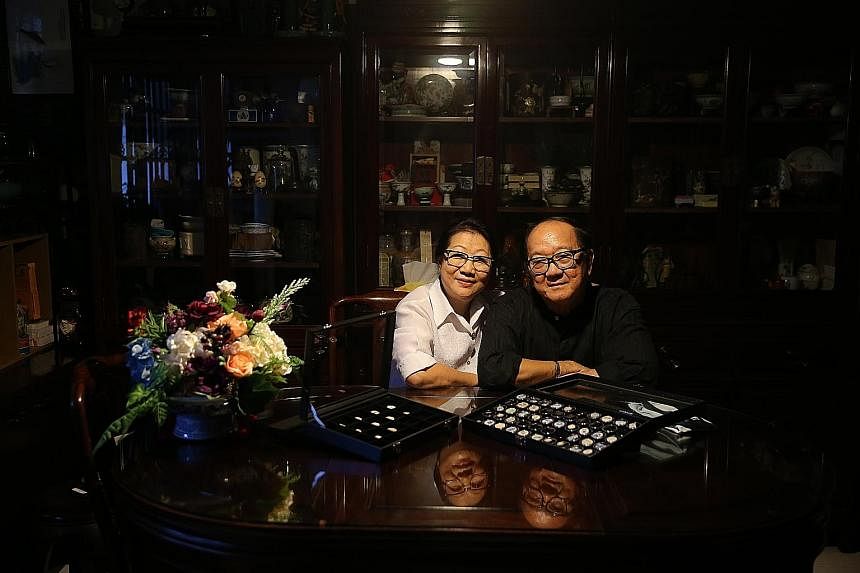A collection of coolie currency will go on display today at the National Library. The 50 artefacts, exhibited until July 28, are porcelain pieces approximately the size of one- dollar coins.
These porcelain pieces were used as payment for the labourers who came mostly from China to Singapore in the later half of the 19th century. Some were engaged in hard labour such as jungle clearing while others worked as farmers and rickshaw pullers.
The coolies were paid in porcelain pieces that could be used only in Singapore - instead of Straits Settlements currency - as their paymasters did not want them to return to China after making money. The coolies paid for food and lodging with the coins.
The exhibition is organised by the National Library Board's Singapore Memory Project. Launched in August 2011, the project aims to document memories of Singapore from individuals and groups such as associations and companies.
The artefacts belong to retired couple Loh Ah Keong, 69, and his wife Patsy Lee, 66. They have been married for 41 years and have two sons, artist Jahan Loh, 38, and senior art director Jaz Loh, 34.
Mr Loh's first exposure to the porcelain pieces began when he was seven or eight years old. He had found two circular ceramic pieces in the drawer of his father, who told him the "valuable" objects had been given to him by a friend.
-
VIEW IT / COOLIE CURRENCY EXHIBITION
- WHERE: Level 10, Promenade,
National Library Building, 100 Victoria Street
WHEN: Till July 28, 10am to 9pm
ADMISSION: Free
INFO: www.nlb.gov.sg
However, Mr Loh started collecting the pieces, acquiring them from flea markets around Singapore, only as an adult in the 1970s. His finds cost him between $10 and $100 each - during a time when a bowl of noodles cost 30 to 50 cents.
"At that time, I collected the pieces only for their aesthetic value. I thought they were cute," says Mr Loh, a former principal laboratory technologist at the National University of Singapore, who retired 31/2 years ago.
Among the artefacts on display are a set of 13 porcelain pieces that the couple are particularly proud of. The set's name is Shi San Yao (13 wonders), as told to the couple by the seller, and has one piece of currency from each of the 13 registered coolie houses in Singapore in the 1900s. The seller, a Mr Chen Hsu Xian, told Mr Loh the set was likely obtained from a brothel, the only place where all 13 currencies were accepted.
-
COOLIE CURRENCY TALK
-
WHERE: Level 1, Visitor's Briefing Room, National Library Building, 100 Victoria Street
WHEN: July 26, 2 to 4pm
ADMISSION: Free
INFO: The talk will be conducted in Mandarin. Register at www.nlb.gov.sg
According to Mr Loh, most stores back then did business exclusively with one coolie house, resulting in stores typically having the currency of only one house. The set cost the couple almost half their combined monthly salaries - they declined to reveal the figure - when they bought it in the 1970s.
It was only when the couple later chanced upon a Lianhe Zaobao article in 1991 about Mr Chen and the rest of his collection that they realised the artefacts played a significant role in history.
The article prompted Madam Lee, who was a senior chemistry technician at Hwa Chong Institution until December last year, to intensify her online research about the artefacts.
When asked why they want to share the collection with the public, Madam Lee says: "The coolies built Singapore up and many lost their lives in the process. We do not want to forget them just because they are no longer around."
Mr Yeong Chong Yee, project manager of the Singapore Memory Project, adds: "We hope this ground-up initiative will encourage more Singaporeans to capture memories of the different facets of the Singapore story for posterity."
The couple will also give a talk in Mandarin and release their book, Coolie Currency, on July 26. It depicts the life and suffering of the coolies in the early days of modern Singapore.
The book, an English and Chinese edition in one volume, is not for sale, but will be available for loan from libraries. It will be published by Invasion Studios, a company run by their sons.
A version of this story first appeared in the August 2015 issue of The Life e-magazine in The Straits Times Star E-books app with the headline "Precious currency".


